Ro Khanna‘s post to the group: Veterans against the G.O.P
As many Republicans demand another huge increase in military spending, here is a reminder that we already spend more on defense than the next eight countries combined.

Read About The Tarbaby Story under the Category: About the Tarbaby Blog
As many Republicans demand another huge increase in military spending, here is a reminder that we already spend more on defense than the next eight countries combined.

By Alice Slater January 24, 2018
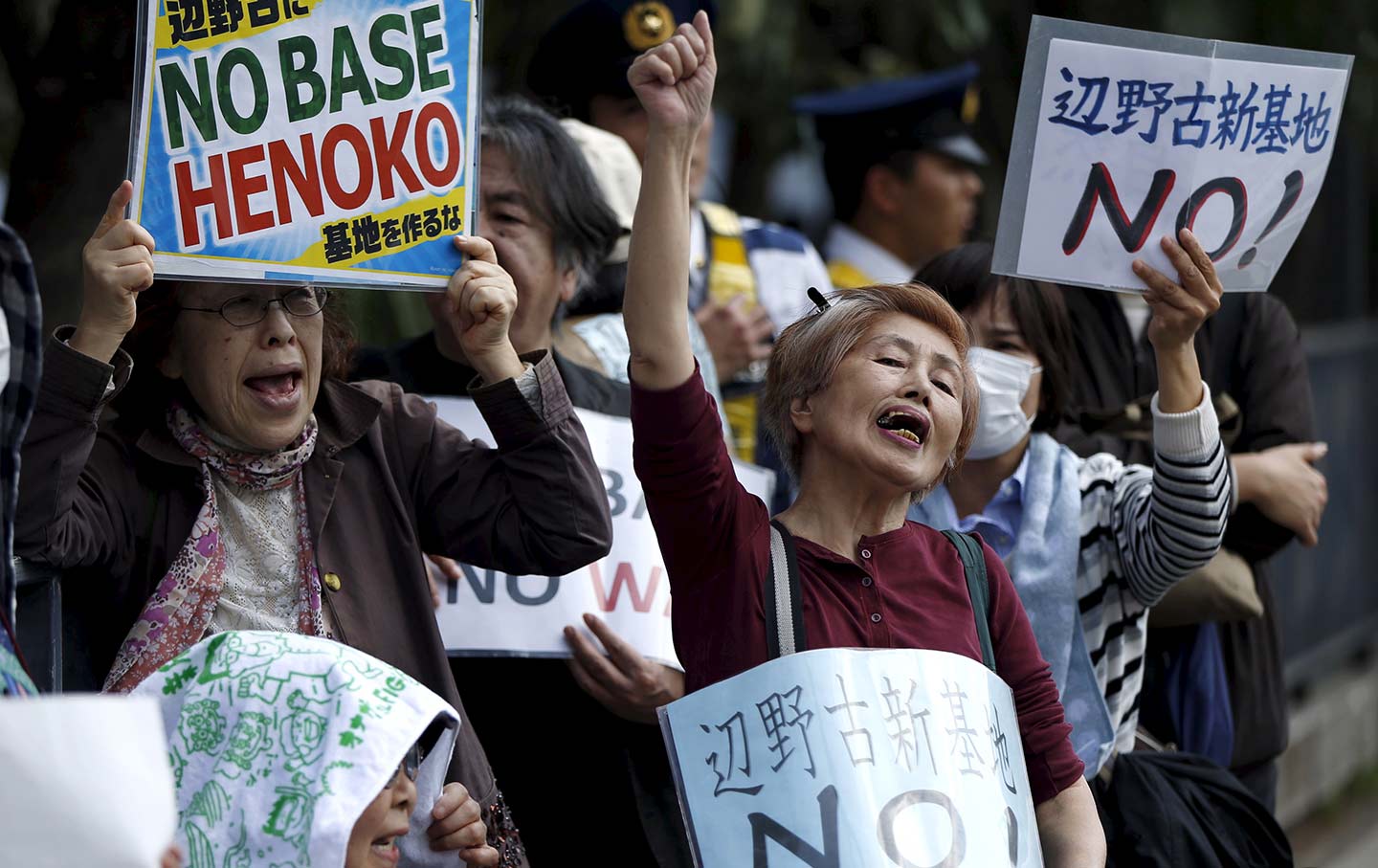 People protest the planned relocation of a US military base in Japan to Okinawa’s Henoko coast on April 17, 2015.(Reuters / Issei Kato)
People protest the planned relocation of a US military base in Japan to Okinawa’s Henoko coast on April 17, 2015.(Reuters / Issei Kato)
On the weekend of Martin Luther King Day, Baltimore University fittingly hosted more than 200 activists in the peace, environment, and social-justice movements to launch a timely new initiative, the Coalition Against US Foreign Military Bases. Ajamu Baraka, Green Party vice-presidential candidate and co-founder of the Black Alliance for Peace, opened the meeting reminding us that Reverend King, in his historic anti-war speech more than 50 years ago at Riverside Church in New York, called the government of the United States “the greatest purveyor of violence in the world today” adding that “the war in Vietnam is but a symptom of a far deeper malady within the American spirit,” while warning that “a nation that continues year after year to spend more money on military defense than on programs of social uplift is approaching spiritual death.” Taking on the very nature of capitalism, King further insisted that
We must rapidly begin the shift from a thing-oriented society to a person-oriented society. When machines and computers, profit motives and property rights, are considered more important than people, the giant triplets of racism, extreme materialism, and militarism are incapable of being conquered.
In a series of panels over two days, conference speakers from every corner of the globe proceeded to describe the extraordinary cruelty and toxic lethality of US foreign policy despite King’s warning more than 50 years ago. We learned that the United States has approximately 800 formal military bases in 172 countries, a number that could exceed 1,000 if you count troops stationed at embassies and missions and so-called “lily-pond” bases, with some 138,000 soldiers stationed around the globe. David Vine, author of Base Nation: How U.S. Military Bases Overseas Harm America and the World, reported that only 11 other countries have bases in foreign countries, some 70 altogether. Russia has an estimated 26 to 40 in nine countries, mostly former Soviet Republics, as well as in Syria and Vietnam; the UK, France, and Turkey have four to 10 bases each; and an estimated one to three foreign bases are occupied by India, China, Japan, South Korea, Germany, Italy, and the Netherlands.
And, apart from the bases, there are other harmful US military impacts in many countries around the globe, which uproot many communities. John Lannon, of Ireland’s Shannonwatch works to end US military use of the civilian airport at Shannon, Ireland. The United States has flown more than 3 million troops and weapons through Shannon, en route to military actions despite Ireland’s decision not to join NATO and its official policy of military neutrality. James Patrick Jordan, with the Alliance for Global Justice, reported that after 9/11 the Northern Command of the US Pentagon added the training of many troops in Latin American countries in order to send them abroad to fight in US wars in other countries.
Peace and environmental activists from every region around the globe shared their experiences protesting the devastating environmental and health impacts caused by US military bases, which are wreaking havoc to health and well-being in so many communities. From Agent Orange in Vietnam, depleted uranium in Iraq, and munitions dumps and firing ranges in Vieques, Puerto Rico, to a toxic brew of poisons along the Potomac River, communities and soldiers as well as children born subsequent to exposure to these toxins are suffering a broad range of illnesses and inherited genetic damage, while the US government ducks any accountability for the harm caused by its mindless dumping and reckless burial of untreated toxic military wastes. Indeed, while some of the United States’ so-called “peer” nations, like Germany, have successfully sued for funds for clean-up of military bases after the US left them in dreadful condition, countries in Latin America, Asia, or Africa have been unable to hold the US to account, which is more evidence of the white patriarchy exercising its privilege, as we learned from Patricia Hynes, a former professor of environmental health at Boston University who won the US EPA Lifetime Achievement award and has created the Vietnam Peace Village Project to support third- and fourth-generation Agent Orange victims.
David Swanson, introducing the panel on US militarism in South America, observed:
Modern imperialism is unique to the US. US exceptionalism justifies imperial bullying and is a prominent sentiment we may have to cure. US nationalism has a religious character. Its destructive mission is imagined as sacred. Fort McHenry is not a historic site—it’s a “National Monument and Historic Shrine.” We may have to learn to value other things including the other 96 percent of humanity before the empire shuts down.
The global breadth of the participants was striking as we heard from activists in Asia, Europe, Africa, Latin America, and the Middle East, all ready and willing to expand this new network and work, not just to close down US bases, but as many expressed so eloquently, to dismantle the US empire and its patriarchal, racist, colonial policies that are causing such harm around the world. At the end of the meeting we decided to reach out and expand our coalition and took the following actions:
Most importantly, we agreed to hold a larger international conference abroad, within one year of the date of this beginning to hasten the end of the empire that subjugates people and destroys the ecosphere in order to maintain its cruel economic system. To add your voice and participate, see www.noforeignbases.org.
Alice Slater is the New York Director of the Nuclear Age Peace Foundation, and serves on the Coordinating Committee of World Beyond War.
Erin Schumaker, HuffPost January 23, 2018

Residents swarmed local hospitals complaining of respiratory problems. Cricket players were forced to put on anti-pollution masks during a national match between India and Sri Lanka. And United Airlines canceled flights into the city, citing the air-quality concerns.
Air pollution isn’t among the causes of death that medical examiners list on death certificates, but the health conditions linked to air pollution exposure, such as lung cancer and emphysema, are often fatal. Air pollution was responsible for 6.1 million deaths and accounted for nearly 12 percent of the global death toll in 2016, the last year for which data was available, according the University of Washington’s Institute for Health Metrics and Evaluation.
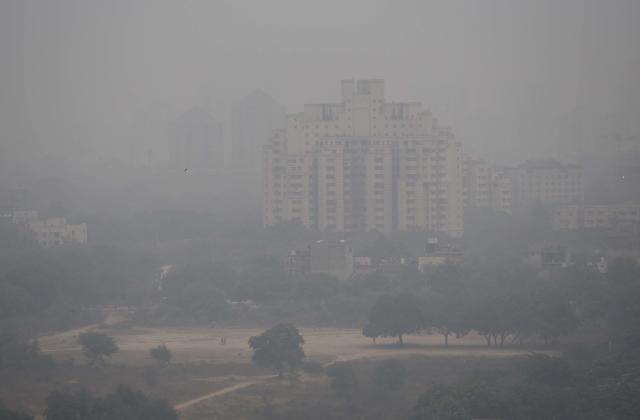
India’s late environment minister, Anil Madhav Dave, made headlines last year for denying there was proof that air pollution was singularly responsible for death in India. Dave conceded that air pollution “could be one of the triggering factors for respiratory associated ailments and diseases,” but he blamed the negative health effects on other issues: poor diet, occupational hazards, socioeconomic status and genetics.
Dave died in May 2017 from cardiac arrest. The new environment minister, Harsh Vardhan, has also said that “to attribute any death to a cause like pollution, that may be too much.”
But there are numerous studies linking air pollution to morbidity around world.
“There is a huge amount of data linking outdoor and indoor air pollution with adverse health effects, including acute and chronic disease, exacerbations of chronic disease and death,” said Dr. Barry Levy, adjunct professor of public health at Tufts University School of Medicine.
The right to breathe is, you would think, the most fundamental right ― more than food, more than water. And that right is being seriously compromised right now. Mayur Sharma, TV personality
Of the 6.1 million air pollution death in 2016, 4.1 million are attributable to outdoor, or ambient, air pollution, according to IHME. Such pollution comes from sources like vehicles, coal-fired power plants and steel mills. Household, or indoor, air pollution is a more pressing problem in low-income countries due to the use of indoor fires for cooking and heat, and it’s linked to an estimated 2.6 million deaths per year. (In India at least, the total air pollution death rate has declined since 1990 even as the outdoor death rate went up in recent years ― due largely to a decrease in the number of deaths attributable to indoor air pollution. Scientists don’t completely understand how ambient and household air pollution deaths interact, and there’s some overlap between them, which is why the sum of ambient and household air pollution deaths exceeds total air pollution deaths.)
Developing countries bear the brunt of the world’s pollution problem
Air pollution is undoubtedly a global public health problem, but not all countries are equally affected.
As many as 1.6 million deaths were attributable to air pollution in India in 2016, according to IHME. That same year, all air pollution was linked to almost 123 out of every 100,000 deaths in the country ― among the highest in the world.
“When it comes to the number of deaths from air pollution, India is No. 1,” Landrigan told HuffPost.
Afghanistan and several African countries have higher ambient air pollution death rates than India, likely because of the extremely dusty conditions in those countries, combined with other pollution sources, like vehicle emissions and crop burning.
“With globalization, mining and manufacturing shifted to poorer countries, where environmental regulations and enforcement can be lax,” Karti Sandilya, one of the authors on the Lancet Commission on Pollution and Health, told Reuters. “People in poorer countries ― like construction workers in New Delhi ― are more exposed to air pollution and less able to protect themselves from exposure, as they walk, bike or ride the bus to workplaces that may also be polluted.”
North India’s topography makes its pollution problem worse, Vox noted in November. The region acts as a basin, trapping pollution from crop burning outside the city and mixing it with industrial pollution from within city limits. And that mix of pollution sources is most intense during the coldest months of the year.
In fact, the problem is getting so bad that some people are moving out of New Delhi altogether. Television personality Mayur Sharma is perhaps the most notable example: He left his job and moved his family out of the capital to escape the pollution.
“The right to breathe is, you would think, the most fundamental right ― more than food, more than water. And that right is being seriously compromised right now,” Sharma told NPR.
As India’s economy has expanded, the country has struggled to keep up with the environmental costs of that growth. Premature deaths from air pollution have stabilized in China, which rivals India in terms of pollution problems and population. That stabilization occurred partly because China has used fines and criminal charges to crack down on pollution. India’s government, however, seems more focused on economic growth than on protecting air quality and the environment.
Because air pollution and related health problems can travel, no country can solve its air pollution problem alone.
Air pollution from Chinese consumption was linked to an estimated 3,100 premature deaths in the U.S and Western Europe in 2007, according to an article published last year in the journal Nature. At the same time, nearly 110,000 premature deaths in China were linked to pollution prompted by consumption in the U.S. and Western European.
“Air pollution can travel long distances and cause health impacts in downwind regions,” Qiang Zhang, co-author of the article and a researcher at Tsinghua University in Beijing, explained to Popular Science.
“Air pollution doesn’t care about political boundaries.” Kirk Smith, professor of global environmental health at the University of California, Berkeley, School of Public Health.
Climate change will likely exacerbate those global concerns, according to public health experts.
They anticipate that climate change will trigger a host of public health problems, including heat- and cold-related deaths, increased disease risk and mental health problems from climate displacement and extreme weather conditions.
Climate change also contributes to air pollution trends ― hotter temperatures increase wildfire risk, and wildfires create ambient air pollution. It also increases ground-level ozone, which is a main ingredient in urban smog, and can trigger health problems like chest pain, throat irritation and lung inflammation, according to the Environmental Protection Agency.
“Higher temperatures are expected to increase the rate of ozone formation,” Levy said.
This makes it even more crucial for local, national and intergovernmental organizations to join forces to address air pollution.
As Kirk Smith, a professor of global environmental health at the University of California, Berkeley, School of Public Health, put it, “Air pollution doesn’t care about political boundaries.”
John Hanno January 20, 2018
The self imposed burden Republi-cons are saddled with, their mis-educated and anti-fact base of supporters they fawn over and rely on to remain relevant, is shrinking and becoming ever more extreme. Almost 60,000 of these elderly voters die every month. They proclaim to represent an alternative to the Grand Old Party – the Eisenhower / Rockefeller Republicans, an alternative “Alt Right” doctrine. What they really expound, is an ultimate “Ult Right” ideology. This new, poorly educated Republiban, immune to critical thinking, is much older and almost exclusively white and Christian. They profess racial purity, nativism, intolerance to humanism or secularism or other religions, exhibit a reckless aversion to history and science and exalt a single minded worship of wealth and exclusivity. Their moral compass has flipped true North.
Having drifted so far from traditional conservative principles, they’ve clearly forfeited any traditional fiscal argument, and with it, the cudgel routinely used to browbeat Democrats trying to help the poor or bolster America’s crumbling middle-class social and monetary infrastructures.
To embellish millionaires and billionaires and thriving multi-national corporations and their investors, who’ve all prospered like never before, with generous tax cuts that balloon the national debt, is not fiscally conservative. To prescribe their tax cut scam as a stimulus to an already thriving economy is not fiscally conservative and might achieve just the opposite. To work day and night for years, to cripple the Patient Protection and Affordable Care Act, which finally slowed escalating insurance premiums and our national healthcare burden, is not fiscally conservative.
To wontonly repeal bipartisan regulations, implemented after decades of debate and evaluation, to guard against the monumental and costly remedies required to correct catastrophic environmental and fiscal disasters, is not fiscally conservative. These Republibaners disregard sound climate science and years of bipartisan environmental legislation culminating in Republican president Nixon signing the bill establishing the Environmental Protection Agency on December 2, 1970.
They disregard milestones of American environmental calamity and redemption, including Rachel Carson’s 1962 book Silent Spring, exposing widespread pesticide poisoning of man and nature; and Congress passing the 1969 National Environmental Policy Act (NEPA), charging the government to “become the protector of earth, air, land and water.” The law declared Congress’s intentions to “create and maintain conditions under which man and nature can exist in productive harmony, and “assure for all Americans safe, healthful, productive, aesthetically and culturally pleasing surroundings.
 New York City before EPA
New York City before EPA
 New York Harbor 1970
New York Harbor 1970
The law also compelled all federal agencies to submit reports (Environmental Impact Statements, EIS’s) for all projects bearing on the environment, and also directed the President to prepare annual Environmental Quality Reports for Congress. When President Nixon signed the bill on New Years Day 1970, he said: “he had become further convinced that the 1970’s absolutely must be the years when America pays its debt to the past by reclaiming the purity of it’s air, it’s waters and our living environment.” “It is literally now or never.”

In short, America’s environment had become a giant shit-hole.
Highlighting this new focus in his State of the Union a few weeks later, Nixon “proclaimed the new decade a period of environmental transformation.” Nixon’s first Environmental Quality Report to Congress on February 10th, contained 37-points. Included in this report, he requested $4 billion for improvements to water treatment facilities. He asked for national air quality standards, a program to lower motor vehicle emissions and federally funded research on reducing automobile pollution. He also ordered a clean-up of federal facilities that contributed to the pollution of the air and water. He sought legislation to end the dumping of wastes into the Great Lakes. He proposed a tax on lead in gasoline. He sent congress a plan on strengthening safeguards on the transportation of oil over the seas. He instituted a National Contingency Plan for remediation of oil spills.
 First Earth Day 1970
First Earth Day 1970
Public protest and demonstrations on Earth Day 1970 and the Clean Air Act Amendments of 1970 were the turning points in America’s environmental consciousness – the realization that air and water pollution must be a national priority; and also the impetus for the creation of the EPA and Nixon’s confirming signature on December 2, 1970. And the scores of toxic super-fund sites discovered throughout the 1980’s, supercharged efforts to begin healing our environment.
 The Cuyahoga River Ignites. Cleavland, Ohio – 1969.
The Cuyahoga River Ignites. Cleavland, Ohio – 1969.
But every one of these environmental programs and more, are under siege, face elimination or reductions by our current, non-conservative and toxic, fossil fuel pandering Republi-con president, the Republi-con controlled congress and Environmental Protection Agency destroyer in charge, Scott Pruitt.
Los Angeles Air Pollution
They’ve quickly rolled back the latest automobile CAFE standards implemented by the Obama administration. This administrations relentless attacks on environmental regulations, began during their first few days in power, with trump reversing President Obama’s rejection of the Dakota Access Pipeline completion, without waiting for the Congressionally mandated Environmental Impact Statement. trump also quickly reversed President Obama by approving the Keystone XL pipeline without a full and comprehensive environmental impact study.
Scott Pruitt, who’s vigorously tried to dismantle environmental regulations and downsize the agency, has also attempted to undermine environmental enforcement actions by the Justice Department. He removed critical climate change and global warming information on the agencies website and ordered employees to not use those words or speak on those issues. Coupled with the attacks on President Obama’s Clean Water Act, the opening of America’s oceans and wilderness areas to oil exploration, and the trump administrations plans to hand over America’s public lands and National Monuments and Parks to fossil fuel and mining interests, these anti-conservatives will single-handedly attempt to reverse much of the progress made since the early days of the environmental movement.


No National Park or Monument or section of public land, set aside over the centuries by past presidents, is safe from these evildoers. Many of the regulations and protections proposed and passed for our environment and public lands were both Republican and conservative bipartisan initiatives. But this administration is not interested in protecting Americans, their environment or their National treasures, only in paying back their omnipotent campaign donors like the Koch brothers.
How far has this Ult Right, alternative reality, alternative fact collection of anti-conservatives, drifted from the Grand Old Party? The 1956 Republican Party Platform is but a distant memory.

Americans overwhelmingly believe in entitlement programs like Social Security and Medicare, believe health care is a right, not a privilege, believe in the Children’s Health Insurance Program (CHIP) and Medicaid for those who need it, believe in protecting our environment – our air and water, believe in sensible regulations, want work place protections for workers, believe Dreamers should be protected and offered a path to citizenship, want our National Parks and Monuments preserved, not exploited for private corporate gain and believe in a fair tax system, not one heavily favoring the rich and politically connected.
These Ult Right, flag waving Republi-con pseudo Constitutional purists don’t believe in responsible governance or, for that matter, in government at all, don’t believe in entitlement programs or welfare, don’t believe in fair play or a level playing field, couldn’t care less about America’s ballooning income inequality, don’t really believe in Democratic principles and honestly believe political compromise in any form is just total capitulation.
This Ult Right only lauds our founding fathers, their Democratic blueprints – our Declaration of Independence and the U.S. Constitution, if it suits their political agenda. They tout States Rights when the Federal Government finds it necessary to step into the fray to protect American’s rights, as they did during the Civil Rights movement in the South. But then extol Federal supremacy, when Progressive States find it necessary to protect their citizens from Federal malfeasance like the trump administrations attacks on environmental and workplace regulations and policies; or when cities or States attempt any sensible gun regulations.
Their latest vitriol is directed at the First Amendment. Republican Senator Jeff Flake took to the floor of the U.S. Senate this week to call out trump for constantly referring to the media as “enemies of the people,” and to defend the U.S. Constitution.
Sen. Flake opened with the Declaration of Independence, by saying Thomas Jefferson wrote, “We Hold These Truths to Be Self Evident”. He said trump infamously uses words spoken by Josef Stalin to describe his enemies. He said: “it bears noting that so fraught with malice, the phrase “enemy of the people,” that even Nikita Khrushchev forbade its use, telling the Soviet Communist Party, that the phrase was introduced by Stalin for the purpose of “annihilating such individuals who disagreed with the supreme leader.”
He also quoted a John F. Kennedy speech for the 20th anniversary of The Voice Of America. “We are not afraid to entrust the American people with unpleasant facts, foreign ideas, alien philosophies and competitive values. For a nation that is afraid to let it’s people judge the truth and falsehoods in an open market, is a nation afraid of its people. He said a free press is not the enemy of the people. Despotism is the enemy of the people and a free press is the despots enemy. He referred to George Orwell’s book 1984 and said Orwell warned: “The further a society drifts from the truth, the more it will hate those who speak it.”
Based on the number of lies trump has told (over 2,000 since entering the White House) and the fairy tales that his cabinet, the Republican controlled congress and his supporters have applauded, excused and disregarded, the GOP is in for a whole bunch of hate, especially from the trump voters who were hoodwinked and who may come to their senses before the 2018 mid-term elections.
The Republi-con “family values platform”, arguably always a false identity, has been blown apart. To support a president who’s so far removed from Christian doctrine and the virtues and teachings of Jesus Christ, is not family values. And wayward Evangelicals have cast their lot with a devilish messiah who may deliver them unto oblivion. The latest blasphemy exhibited by prominent Evangelical leaders was exposed by the Wall Street Journal this week. To excuse and justify the $130,000 payment to a porn star to cover up a year long affair while trump was married to Melania and just after she gave birth to their son is the height of hypocrisy. These same religious popinjays spent years preachifying about Bill Clinton’s indiscretions.
trump’s attempts at reimaging, this pandering political party of the rich and powerful and multi-national, connected corporations, with a phony populist agenda, is laughable, if it weren’t so destructive. Supporting the Koch Brothers anti-labor ALEC legislative agenda breaks every promise he made to desperate rust belt workers during the election. And for con-man-in-chief trump to offer false hope to out of work steel workers and coal miners shackled to a dying industry is beyond cruel.
trump has no core set of beliefs, no modicum of integrity; he cares for no one but himself. His egocentric self obsession is boundless. He only admires people who’ve amassed fortunes, no matter how they attained that wealth, and dismisses and devalues anyone who labors for a paycheck.
Nothing is normal, or traditional or conservative about this president, his Ult Right administration or the Republi-con controlled congress. Those who’ve attempted to normalize trump’s un-presidential antics, his immoral character flaws, his obsession with undermining everything President Obama accomplished, his unfailing allegiance to Vladimir Putin and the Russians, his infatuation with autocratic despots and anti-democratic fiat, and his self dealing and conflicted and criminal business ethics – will regret, like the dozens of folks already expelled from his administration, any association with this trump travesty.
America will survive trump but the GOP and the Christian Right may not.
Mary Papenfuss, HuffPost January 20, 2018
Just days after the House passed its version of the federal tax law slashing corporate tax rates, House Speaker Paul Ryan collected nearly $500,000 in campaign contributions from billionaire energy mogul Charles Koch and his wife, according to a recent campaign donor report.
Koch and his brother David spent millions of dollars to get the tax law passed and are spending millions more in a public relations campaign in an attempt to boost support for the law, The Wall Street Journal reported.
Koch Industries, one of the largest private corporations in the nation, operates refineries and manufactures a variety of products. The new tax law — which slices corporate tax rates from 35 percent to 21 percent, slashes estate taxes and includes a special deduction for oil and gas investors — is expected to save the Koch brothers and their businesses billions of dollars in taxes.
Just 13 days after the tax law was passed, Charles Koch and his wife, Elizabeth, donated nearly $500,000 to Ryan’s joint fundraising committee, according to a campaign finance report filed Thursday.
Five other donors, including billionaire businessmen Jeffery Hildebrand and William Parfet and William Parfet, each contributed $100,000 in the last quarter of 2017, according to the records.
“It looks like House Speaker Ryan is quickly being rewarded for passing this legislation that overwhelmingly benefits the Kochs and billionaires like them,” Adam Smith, spokesman for campaign finance reform nonprofit Every Voice, told the International Business Times, which first reported the Koch contributions.
The Koch donations were paid into Team Ryan, which raises money for the speaker, the National Republican Congressional Committee and a PAC run by Ryan. On the same day, Charles and Elizabeth Koch also each donated $237,000 to the NRCC.
The Koch brothers, worth an estimated $100 billion together, have become the gorillas of dark money contributions distorting American democracy since the Supreme Court’s decision in Citizens United v. FEC, which opened the door to unlimited campaign contributions from corporations, unions and wealthy individuals to outside groups. The brothers are using their massive wealth to push a political agenda that’s the “most hard-line libertarian philosophy” in America, according to Jane Mayer, author of Dark Money: The Hidden History of the Billionaires Behind the Rise of the Radical Right.
Ryan has indicated that he won’t run again when his term is up this year, Politico reported, though he hasn’t made an official announcement. If he doesn’t run, his contributions would be redirected.
Clarification: Language in this story has been updated to better describe the Supreme Court decision in Citizens United v. FEC.
Alana Abramson, Fortune January 22, 2018

A nonpartisan watchdog group has filed complaints with both the Department of Justice and Federal Election Commission alleging that the reported payment to adult film star Stormy Daniels, who said she once had an affair with President Donald Trump, arguably violates campaign finance laws and should be subject to an investigation.
The group, Common Cause, sent copies of the complaint Monday to the FEC and the DOJ, the latter of which was addressed to Deputy Attorney General Rod Rosenstein and accompanied by a letter requesting an investigation into the payment.
The Wall Street Journal reported earlier this month that in 2016, Trump’s longtime attorney Michael Cohen had arranged for a payment of $130,000 to Daniels, whose real name is Stephanie Clifford, to prevent her from publicizing an alleged sexual account that had occurred a decade earlier with the then-candidate. He paid her, according to the Journal, through a bank account linked to company called Essential Consultants LLC, which he set up in Delaware a month before the presidential election.
The complaint alleges that the payment was illegal because it was designed to influence the election and, at 130,000, it exceeds the maximum amount of $2,700 per person allotted under campaign finance law. The source of the $130,000 has also not been revealed, the complaint argues, and any individual who contributes over $200 to a campaign must disclose his or her identity. Since donations from corporations to federal candidates are prohibited, the complaint urges the DOJ and FEC to investigate the source.
“These apparent violations are not simple bookkeeping errors, but seemingly a deliberate evasion of the laws on the books to ensure Americans get a full accounting of the money raised and spent by and for candidates for the presidency,” Paul S. Ryan, the vice president for policy and litigation at Common Cause who filed the complaints, explained. “These actions are just the latest examples of the president, his family, his campaign, and subsequently administration, playing fast and loose with the laws that apply to them.”
In an e-mail to Fortune, Cohen called the complaint “baseless” and denied that Trump misled the FEC. “The Common Cause complaint is baseless along with the allegation that President Trump filed a false report to the FEC,” he wrote. He did not respond to follow up questions for clarification about this statement and the payment as a whole.
The Justice Department and the White House did not immediately respond to request for comment. A representative for the FEC was out of the office due to the government shutdown.

Zoya Teirstein, Grist January 21, 2018
This post originally appeared on Grist.
Todd Tanner has a pretty sweet offer for his fellow Montanans: a new shotgun in exchange for science-based evidence that he’s wrong about climate change.
The conservationist uses the challenge in an attempt to raise awareness about our warming planet. A lot of people where Tanner lives in Bigfork, Montana, would probably like to take him up on his offer: The state has one of the highest rates of outdoor recreationists in the country, and Tanner is no exception. He was planning on going hunting after we finished our interview. “You wouldn’t know it,” he said over the phone, “but I’m literally walking around in a pair of wool pants.”
Tanner is sure he’ll never have to hand over that new shotgun, though he says he would love to find out that anthropogenic climate change isn’t real. “If someone shows me the error of my ways they can have their choice,” he said. “They can have any rifle, shotgun, pistol, or rod I own, and I’ll walk away feeling like I got the better end of the bargain.”
Since 2011, Tanner has harnessed his prominent position in Montana’s hunting and fishing communities to get people engaged. After wildfires incinerated forests and droughts desiccated rivers in Big Sky Country this year, agitated sportsmen and women have become easier to find. Tanner’s nonprofit, Conservation Hawks, is part of a coalition of grassroots organizations trying to pull conservatives into the conversation about rising temperatures.
And it’s starting to work. There’s a small but growing alliance of concerned conservatives who want to reclaim climate change as a nonpartisan issue. This motley crew of lobbyists, Evangelical Christians, and far-right radicals call themselves the “eco-right.”
Christine Todd Whitman, former chief of the Environmental Protection Agency under President George W. Bush, believes the eco-right has a real chance at inspiring action in Congress. With Republicans controlling both houses of Congress and the White House, and a record-breaking year of environmental disasters finally behind us, 2018 could be the year the party reverses course. “If you look at the damage from just this last summer, from the floods, the droughts, the fires, it’s pushing $300 billion out of our economy,” Whitman said.
In Montana, Tanner diligently crafts his messaging in the hopes that he can turn even a small portion of the red state’s hunters and anglers into climate activists. There’s also a broader, national effort to target American conservatives. RepublicEn, for instance, is a coalition of more than 4,000 conservatives and libertarians pushing for environmental action. The organization hopes that, generations from now, the eco-right will be remembered for leading the United States out of the climate crisis and into the clean energy revolution.
Alex Bozmoski is the director of strategy and operations at RepublicEn. It’s a job he’s well-suited for — he used to be a climate denier himself.
As an undergrad at Georgetown, Bozmoski enrolled in a climate science class as a joke, planning to heckle the professor. But when challenged to justify his skepticism, Bozmoski found he had drawn erroneous conclusions fueled by conservative radio shows and Fox News. He cast around in his network of fellow Republicans and conservatives for people he could discuss his newfound understanding of climate change with, but he kept coming up empty.
Bozmoski found that, despite a long legacy of environmental leadership in the Republican Party, most modern-day members weren’t even thinking about our overheating planet, let alone figuring out how to address the problem.
Environmental issues weren’t always this polarizing. President Nixon set a firm national precedent when he created the EPA and the National Oceanic and Atmospheric Administration in 1970. The Senate passed the Clean Air Act that same year, 73 votes to 0.
Fast-forward to the 2012 presidential election, when multiple Republican candidates advocated for abolishing the EPA. Two years later, just one of all the 107 Republicans running for Senate mentioned climate change.
It’s no wonder Bozmoski felt betrayed by his party and ill-equipped to apply his conservative thinking to the issue. Yet he could still understand why his fellow conservatives didn’t care.
“When you don’t trust anyone talking about climate change, when you don’t see your tribe talking about solutions that fit with your worldview, it’s really easy to cope with the problem by ignoring it or denying it,” he said. Bozmoski did neither.
He went hunting for like-minded Republicans and found Bob Inglis, a former U.S. representative from South Carolina who came out swinging against global warming in 2010 (a position that likely cost him his seat in the House). Bozmoski tracked the ousted politician down in 2012, and they started a project called the Energy and Enterprise Initiative. RepublicEn grew out of that project. They popularized the term “eco-right.”
RepublicEn hit the road in 2014, traveling across the country to persuade conservatives that their principles and values can be applied to curbing greenhouse gas emissions. Since then, RepublicEn has held 300 events across America, mostly for expressly conservative audiences. Bozmoski estimates that the organization has reached more than 26,000 Americans. He gets people to listen by reminding them that they have power.
“You are the most important environmental champions on planet Earth,” he tells them. “Republicans won’t lead without first being led by their constituents. You have an outsized influence on our ability as humanity to deal with this problem.”
RepublicEn hopes to generate conservative support for a revenue-neutral carbon tax. “It’s the only solution that’s effective enough to address climate change and fits with conservative principles,” Bozmoski said.
A carbon tax is pragmatic and relatively simple: Put a rising fee on the use of fossil fuels, forcing companies to curb their emissions. To make it revenue neutral — and more acceptable to conservatives — the money generated by that fee goes back to Americans through checks or by cutting payroll or sales taxes.
A carbon tax in any form is unlikely to make it through today’s highly partisan Congress, so, in the meantime, RepublicEn advocates for a level playing field for wind and solar energy, less leaky oil and gas infrastructure, and nuclear power.
Jessica Fernandez, a lifelong Floridian and conservative, was one of the people inspired by RepublicEn’s national eco-right tour. Her upbringing might have had something to do with it. “At my house,” she said, “we grew up with solar panels on the roof and composting.”
In 2014, she met Alex Bozmoski and Debbie Dooley, head of a subset of the Tea Party called the Green Tea Party. Fernandez, a long-time director of the Miami Young Republicans, liked their pitch that conservatives should be leaders in conserving the environment. “It’s groundbreaking, I know,” she said with a chuckle. When trying to engage other Republicans on green issues, she quickly learned that an alarmist attitude just doesn’t work.
What approach does work? A focus on money. Fernandez said that conservatives are more likely to respond positively if you say, “Hey! Fixing the climate is something that can benefit you economically.” She tells them about community solutions like solar co-ops, groups of homeowners who use their collective purchasing power to install solar on the cheap, thereby reducing monthly electric bills.
Tanner, the conservationist from Montana, approaches the issue from a different angle. He thinks talking to conservatives about climate change requires language that is hyper-specific and localized.
The fine lines between demographics are razor-sharp. Messaging that works for a hunter might not work for a fisherman, even though both face the same set of environmental consequences: a scarcity of fish and game. “It’s almost like code,” he said. “As soon as you try and talk to people who aren’t like you, all of these barriers go up.”
For that reason, Tanner says the messenger and the message have to be authentic. He spends his weeks customizing language that personally appeals to various sub-demographics of sportsmen and women. There are millions of hunters and anglers in the United States. “That’s a ton of us,” he said. “If even 20 percent or 30 percent of them got engaged, it would have a huge impact.”
James Tolbert is an unlikely environmental lobbyist. He spent 27 years helping big corporations clean up pollution. In 2013, the engineer was wrapping up work on the fallout from a million gallons of crude oil spilling from the Enbridge Pipeline into the Kalamazoo River in Michigan when he decided to switch teams. He traded in his senior position at energy infrastructure firm AECOM for a role as a lobbyist at Citizens’ Climate Lobby.
While Conservation Hawks and RepublicEn use grassroots organizing to drum up support among conservatives, lobbyists like Tolbert use a “grasstops” approach to push Republican representatives in Congress to support solutions.
We “create political space with a member of Congress by showing him that there is support from key members in his community,” Tolbert said. Citizens’ Climate Lobby calls these key community members “influencers” — business leaders, members of the chamber of commerce, even regional newspaper editorial boards. He sees them as crucial to getting anywhere with members of Congress.
When a Republican representative hesitates to accept climate change for fear of losing an upcoming reelection campaign, a well-placed opinion piece in a hometown newspaper or an endorsement from a local business leader can occasionally tip the scales.
It’s premature to say the winds of change are blowing, but we may be seeing the beginnings of a breeze. This month, more than 100 congressional lawmakers, including 11 House Republicans, wrote a letter to President Trump urging him to address climate change and the threat it poses to national security after his administration left the issue out of its national security strategy.
William Ruckelshaus, who served as EPA administrator under Nixon and President Reagan, has met with a number of eco-right organizations. He believes massive support for significant action on global warming is “going to have to include conservative groups, and virtually every discipline in society.” When Republicans do finally warm up to the idea of a conservative environmental movement, the eco-right will step out of the wings.
“They’re going to begin to get worried” about the growing impacts of a warming planet, Ruckelshaus said. “If there are organizations that they feel more comfortable with, they’re more likely to sign on.”
The eco-right hasn’t exactly received a warm embrace from the conservative movement. In 2014, the Washington, D.C.-based public relations firm Berman and Company launched the Environmental Policy Alliance — yes, EPA for short. The outfit is “devoted to uncovering the funding and hidden agendas behind environmental activist groups.” Among its targets: climate-conscious organizations like Tanner’s Conservation Hawks.
Shortly after it started, the alliance launched a website called Green Decoys, which claims that left-wing environmental NGOs use sportsmen as a cover for their “radical environmental activist” agendas.
The site has a different informational video targeting each kind of American conservation group. In the “Montana” video, a man in camouflage carrying a rifle speaks straight into the camera. “I’m a real sportsman,” he says. “And I’m a member of organizations that support hunting and fishing.” His double appears on screen, wearing a camo neckerchief. “And I’m a phony sportsman,” the double says. “I support candidates that think we cling to our guns because we just don’t know any better.”
Tanner isn’t worried about people who question his legitimacy. “If the folks who run Green Decoys, and I’m well aware of who they are, want to get together and see who’s a better hunter or fisher, or who’s the real deal and who’s not,” he said, “we are more than happy to have that conversation.”
Bozmoski recognizes that some conservatives have gone too far down the path of denial to be receptive to RepublicEn’s message. “We aren’t big enough to go around persuading people who really believe, to their core, that this is a government conspiracy,” he said. “We don’t worry about the people on the fringe who are hobbyists in antagonism on climate change.”
Fernandez hopes the tide of support for environmental legislation will rise to the highest levels of government.
“Climate change doesn’t have a political affiliation,” she said. She believes that even President Trump might change his tune if the solution is “repackaged as something that benefits the United States of America.”
What should the eco-right do while the top dogs on Capitol Hill insist on looking the other way? Ruckelshaus, the former EPA chief, says to “keep on.” But as we descend into ever-worsening environmental chaos, the question remains: How soon can these conservatives alter the course of history?
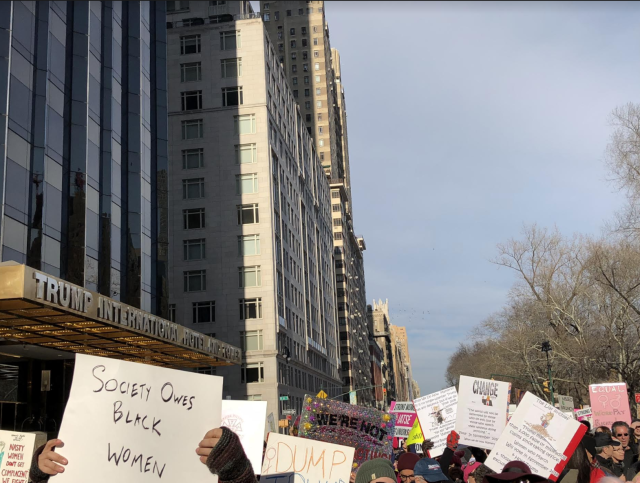
The marchers stretched for 30 city blocks along Central Park West, from its starting point in front of the Trump International Hotel at 59th Street all the way back to the Museum of Natural History at 86th. The crowd filled the side streets along that stretch too. They stood shoulder to shoulder on 71st and 75th, waiting for the police to remove the barricades so they could join the sea of people.
New York Mayor Bill de Blasio’s office estimated the crowd size as being at least 200,000 people.
The result was a stretch of bright pink hats and largely hand-drawn signs, supporting a swath of causes. The atmosphere was that of a New Orleans funeral — a mix of high spirits and deep mourning, interspersed with marching bands and a smattering of costumes. Down Central Park West it wound, onto Sixth Avenue, ending at Bryant Park in midtown.

Diane Carlson and Roseanne Ryan took a train from Stony Brook University at 7:40 a.m. and headed for the hotel room they had booked in Manhattan for that night. They had been at last year’s march in Washington, and anticipating similar crowds here, they decided to stay overnight rather than fight traffic going home.
They put their sign together at the hotel. “Make America Kind Again,” it read. There would have been a picture too — of the Statue of Liberty kicking Donald Trump with her boot — but they forgot to pack it, and once at the march they decided that was for the best. “It wasn’t the kindest image,” Carlson said. “Now this is a completely kind sign.”
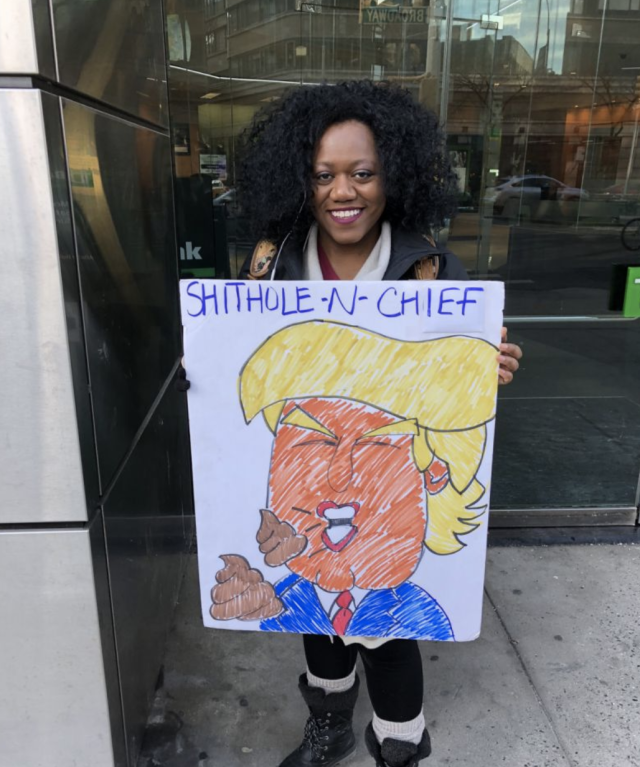
Other sign makers were not as concerned with being kind. Using the president’s “own language,” flight attendant Jonni Lane drew a picture of Trump with the poop emoji spewing from his mouth. “S***hole-N-Chief,” it read, and was one of hundreds of curse-filled signs held by marchers. “It’s been a rough year,” Lane said of her reasons for marching. “I’m here to protest, to make my voice heard, to vent. A little shouting never hurt anyone.”
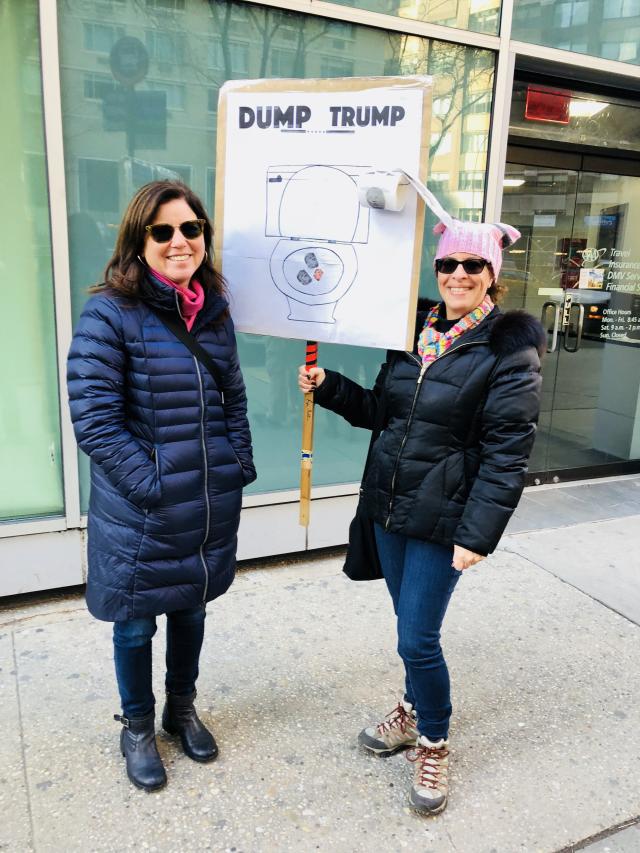
More complicated, but on the same theme, was the “Dump Trump” sign carried by Evy Lieberman and her friend Nancy Gillon, who had driven in from Tenafly, N.J. Attached to the sign was an actual roll of toilet paper, each sheet of which carried a picture of the president.
“I’m here because she marched last year and said it was an incredible experience surrounded by all those determined people,” Gillon said, pointing to Lieberman. “I needed to experience some of that energy.”
“And I needed to get it back,” Lieberman said. “I’m here because I’ve been miserable.”

Officially, march organizers are describing the events taking place in cities around the country and the world as “marches” rather than “protests” — and they stress that the purpose is to encourage voter participation in the 2018 midterm elections and beyond.
In that spirit, Yisel Fernandez carried a sign that said, “I’m Hispanic, I’m a Mother, I’m a Business Owner & I Vote.” She was marching for her 2-year-old daughter, she said, whom she was going to bring but decided to leave at home because, despite the unseasonably warm high of 51 degrees, it was still “really cold” for a toddler.

Loveena Rajanayakam was also marching for her young daughters, and she brought them along, bundled up in matching purple winter coats. Together they held signs that read, “ReSISTER” and “I Love Naps But I Stay Woke.”
“It’s very important for them to understand that they can do anything, shouldn’t take anything for granted, and have a voice that needs to be heard,” she said.

And Amanda Hambrick was marching with 1-year-old Skylar, who was kind of marching for herself. The toddler did her best to toddle along with her mother with a sign around her neck that read, “I marched before I walked.”
Asked why she was marching, Hambrick said, “We’ve got to show up for each other. There’s too much at stake.”
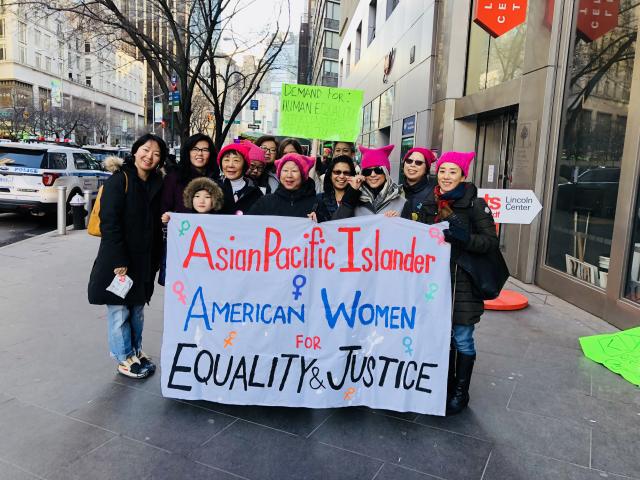
In a marvel of logistics, large groups of marchers managed to meet up on a variety of street corners and march together. A group of 100 Asian-Americans did so at Broadway and 69th Street, representing a collection of advocacy groups, including the Asian Women’s Network, the Korean American Service Center, and Asian Women United.
“Power to the polls, that’s our cause,” said Joyce Samoa, one of the marchers. “We want Asian-American women to start voting. We are the poorest group in New York City, and we are underrepresented on the voter rolls and in public office.”

Ann Marie Morris, Barbara Spitzer, and Marc Allen stopped on their way to the march to shop. They already had their signs. “Truth, We Miss You,” Allen’s read; “Build A Wall Around Trump! I’ll Pay For It,” read Morris’s.
But they added messages from one of the many button vendors lining the sidewalks. “Go Fact Yourself,” read one purchase. “Michelle Obama 2020” said another.
“He’s a disgrace, he’s an embarrassment,” Morris said of why she was marching. “We wouldn’t accept this behavior from a CEO, a Hollywood actor; no one else is allowed to act like this.”
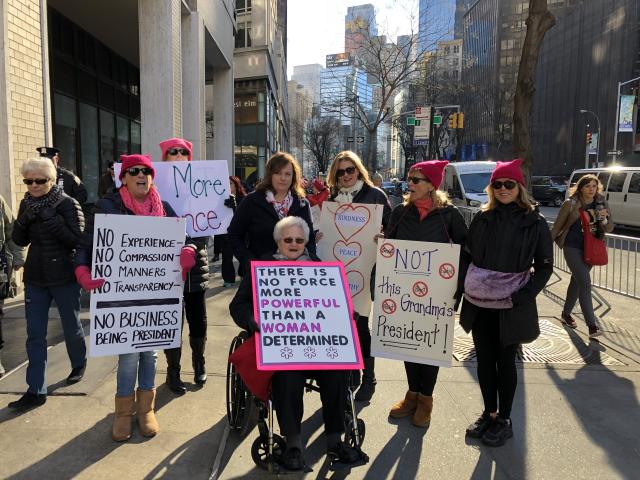
Lois Hoffmann turned 80 this year, and the Women’s March was “on my bucket list,” she says. So her daughters brought her down from her New Hampshire home to protest.
“There is no force more powerful than a woman determined,” read her sign, which she held while her daughter Catherine Sorenson pushed her wheelchair.
“Not this Grandma’s President,” read Janet Mehan’s as she walked next to her.

There was no one keeping track, but odds are that Ruth Rosar was the oldest marcher present in New York City. She was born on March 3, 1916, she said, making her almost 102 years old.
Her mother was a suffragette, marching for the women’s vote, and now Rosar was decked all in red, wearing a button that said, “Another Nasty Woman Against Trump,” and attracting a crowd.
“I have been watching Donald Trump and the 68 million people who voted for him tear down our nation, agency by agency. I can’t really march,” she said, pointing to her walker and explaining that she would spend the day on a quieter sidewalk greeting passersby. “But I can be here.”

Women like Rosar were on Ana Lombardo’s mind as she marched. “Grateful to the Women Before Me Who Fought For My Rights,” her sign read.
Others were on her mind as well. On one side of her sign’s handle she had attached a photo of her friend Christine, who died of breast cancer three years ago, and “who would have absolutely been here,” Lombardo said.
And on the other side was a photo of her friend Sal, who died of AIDS less than a year ago. Sal was too sick to attend the 2017 march with Lombardo, but she carried his photo there as well. “And he made me promise that if I went this year, I would take him with me in spirit again,” she said.

A different woman was in Shawn Gutcheff’s mind — and on her sign. She brought a poster of Oprah Winfrey with her from Salt Lake City because, she said, “I’m marching for Oprah. For everything that is the antithesis of Donald Trump.”

Mya Stein, Ally Dolmanisth, Haley Prisloe and Kate Gregory are all 17 years old and will all vote for the first time this year. They take that responsibility seriously, they say, and came to march so that others would register.
“I think our generation needs to experience these things so that we can build our own future,” said Dolmanisth’s 15-year-old sister, Sophie. So the group put sparkly face paint on their cheeks and used bright colors on their signs.
“Without Hermione, Harry Would Have Died in Book 1,” read Stein’s.
“Girls Just Want to Have FUNdamental Rights,” read Dolmanisth’s.
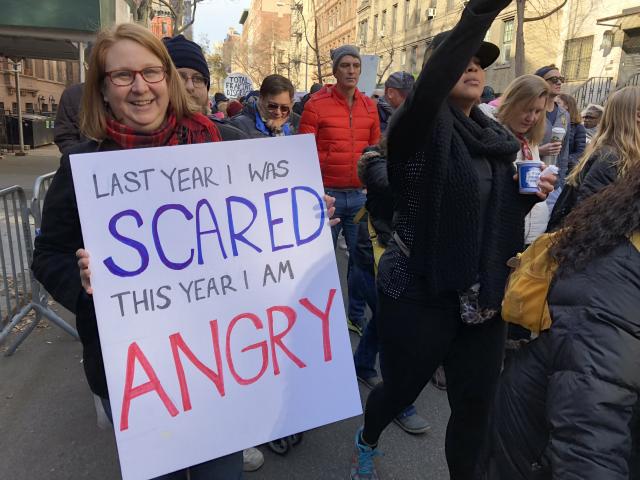
Many of the marchers were second-timers, having participated in the 2017 march in New York or elsewhere.
Susan Ferziger was one of those, and now she was back carrying a sign that said, “Last Year I Was Scared, This Year I Am Angry.”
“It’s worse than I’d feared,” she said, listing more than a dozen administration actions with which she disagreed. “So I’m back.”
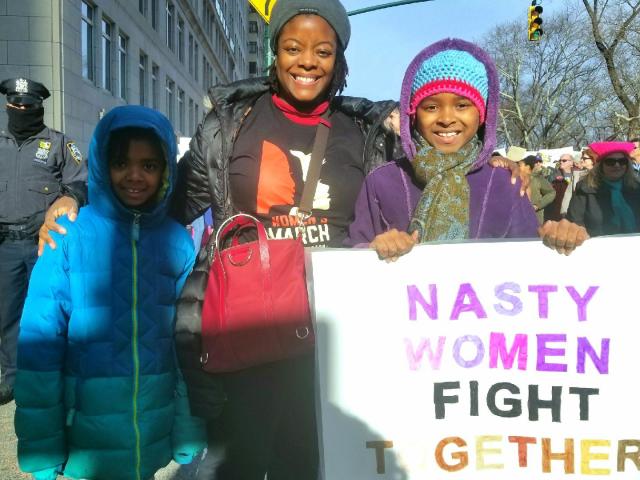
It was also not Charise Fisher’s first march. When she was 12, her mother brought her to a protest against South African apartheid, and she says, “I will never forget the day Nelson Mandela got out of jail.” To carry on the legacy of protest, she brought her daughters, 7-year-old Nina and 9-year-old Lauren, along today.
“As black women, we stand on the legacy of the people who marched before,” she said. “So this generation has to continue marching.”

All along the route there were political conversations, and one of the more common themes was exactly what these large gatherings of protesters actually accomplished.
Clarissa Rodriguez and Eliza Mendel, both classmates from SUNY Purchase in Westchester, said they were marching because they believed in the power of hundreds of thousands of voices.
“People said last year that the Women’s March wasn’t going to do anything, it wouldn’t change anything,” Rodriguez said. “But it created real action — the #MeToo movement, the voter registration drives, all those women running for office.”

Ellie Engstram, who traveled to the march from Ohio, also agreed that there was value in the gathering. If nothing else, she said, being together in one place was reinforcing for those who participated.
“It’s important to get together to have our voices heard and to have conversations rather than just tweeting,” she said, carrying a sign that read, “Liberty Is a Lady for a Reason.”
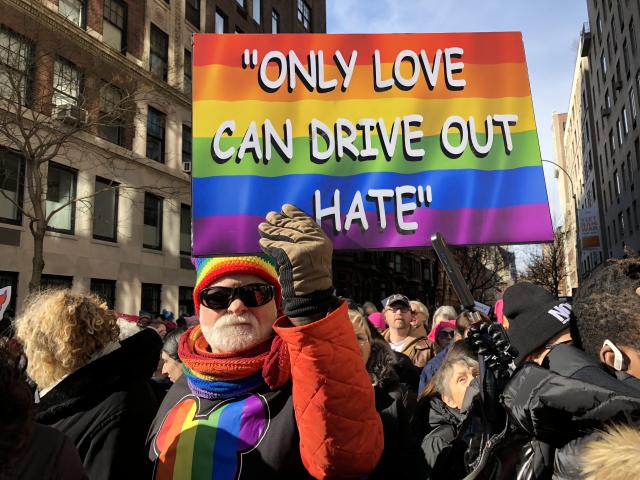
John Cadue was dressed head to toe in rainbows, carrying a sign that said, “Only Love Can Drive Out Hate.”
When asked why he was marching, he swept his hand down the length of his multicolor-clad body and said, “Doesn’t this speak for itself? Activism is alive and well.”

Cheryl Snow wasn’t sure what sign she would carry today. Then she woke up to the morning news and was certain.
“1/20/17 Trump Inaugurated, 1/20/18 Fed Gov Shutdown,” she wrote in red marker on white posterboard. “Trump said that he would run America like his businesses.”
Her friend Doria Bachenheimer, who carried that sign, said that she and Snow were marching for many reasons — “for human rights, for basic human decency, for democracy…”

Artist Monica Martino realizes that she has made a nice living off of Donald Trump. A year ago, the Atlanta native painted a poster showing a ripe orange peach topped with a shock of blond hair and the message “ImPeach.” She put it on her website and has sold quite a few.
This year, her poster has a picture of the Statue of Liberty and the message “Girl, Hold My Earrings,” as Lady Liberty prepares for a fight. She put her web address on the poster and figures she will sell a number of these images too.
“It’s good for business but terrible for my morale,” she said of the current administration. “I want to put myself out of business. I want to go back to drawing animals and other cute stuff.”

On the sidewalk along Central Park South, as a stream of marchers passed by, Valeama Virginie and her brand new husband, Cochan Yves, stood confused.
She was in her white gown, he was in his brown suit, and they were headed for Central Park to take wedding photos immediately after their ceremony when they encountered quite a crowd.
From a French island off the coast of Madagascar, they had come 20,000 kilometers to be married in New York but had not heard there would be another big event that day.
“What is this for?” Virginie asked. “It’s against Trump,” a passerby told her. Bride and groom smiled and pumped their fists.
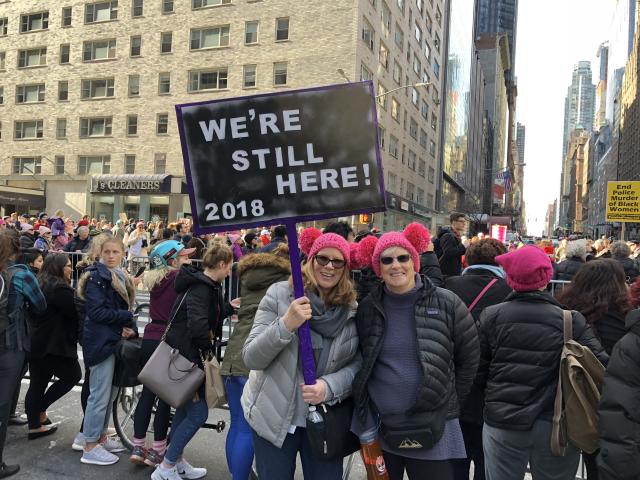
Two hours after the march first began to move, with no end in sight, Candy Fitts and Barbara Posner, both from Connecticut, stood watching from the sidewalk wearing the ubiquitous pink “pussy hats” and holding a sign that read, “We’re Still Here! 2018.”
They were already thinking of next Jan. 20 and wondering whether there would be a need to march again. They were fairly sure there would — that the march represented a real change in the political landscape and those who were marching, once emboldened, would not go quietly back to their former lives.
“Our message is that we’re not going away; nobody’s giving up,” Posner said. “This will continue until we’re heard.”
Read more from Yahoo News:
 Marcellus Shale rig and gas well operation on Ridge Road in Jackson Township operated by Rex Energy. WCN 24/7 / Flickr
Marcellus Shale rig and gas well operation on Ridge Road in Jackson Township operated by Rex Energy. WCN 24/7 / Flickr
By Simon Davis-Cohen January 18, 2018
In early January, a federal judge ordered the nonprofit law firm Community Environmental Legal Defense Fund (CELDF) to pay $52,000 to an oil and gas exploration company for defending a rural Pennsylvania township’s ban on underground injections of fracking waste.
This sanction comes at the request of Pennsylvania General Energy Company (PGE) and the Pennsylvania Independent Oil & Gas Association, but is part of a growing trend to prevent municipalities across the nation from pushing back against state and federal attempts to overrule them.
Starting in 2012, PGE proposed an injection well which, according to Grant Township’s Board of Supervisors, “would receive 30,000 barrels [1.26 million gallons] of frack wastewater per month for 10 years.” The board of supervisors for this small community near Pittsburgh warned that the injection well “threatens to subject every resident of Grant Township to a slow poisoning, and threatens thousands more who depend on Grant Township’s watershed for clean water.”
The community’s law, they added, bans the injection well “as a violation of our basic civil rights.” PGE operates multiple gas-extraction wells in the township.
Rights of Nature, Local Governance
CELDF, which has defended Grant’s efforts to prevent waste injection wells for over three years, has worked with some 200 municipalities in the U.S. to defend local laws challenging similar corporate projects. The group aims to drive state constitutional change to bolster the rights of local residents and ecosystems against what it calls regressive state preemption and corporate personhood.
Grant Township, for example, is elevating a “right of self-government,” rights “to clean air, water, and soil” and “ecosystem rights” above corporations’ “rights” to inject waste from oil and gas extraction in the township.
These types of local laws often face substantial legal pushback from private corporations and states which claim authority over issues such as fossil fuel production. Along with the sanctions against CELDF, PGE is suing Grant Township itself, population 741, for damages that would likely be in the hundreds of thousands of dollars. Among its claims: The injection well ban violates the corporation’s rights as a “person” under the First, Fourth, and Fifth Amendments; the Equal Protection Clause of the Fourteenth Amendment; and the Contract Clause and Supremacy Clause of the U.S. Constitution.
Grant Township is the fourth local government CELDF has defended in federal court.
‘Frivolous’ Legal Arguments
At the heart of the court’s decision awarding PGE sanctions against the legal nonprofit (the company originally asked for $500,000) is an argument that the sanctions are justified because CELDF’s legal arguments are contrary to “settled” law and therefore “frivolous.” This reasoning asserts that corporate personhood and Pennsylvania’s authority over municipalities on issues affecting drinking water and fossil fuel development is settled, and therefore CELDF’s defense of Grant’s claim to the contrary is “clearly unreasonable.”
Grant Township, the court wrote, “seeks to disavow constitutional rights afforded corporations so as to prevent PGE from the lawful exercise of its right to pursue gas extraction related activities within its borders.” On top of all this, Grant’s law recognized legal rights for a local ecosystem. CELDF’s attempt to represent that ecosystem in court, the judge ruled, violates the Federal Rules of Civil Procedure, a set of rules that govern how legal proceedings take place in U.S. district courts.
Local Governments Sanctioned Across U.S.
CELDF is not alone in facing sanctions for challenging so-called settled law on similar issues. Defend Local Solutions is a campaign led by Tallahassee’s Mayor Andrew Gillum which is aimed at expanding the powers of municipalities in Florida. The campaign said at least seven states have “super preemption” bills on the books that sanction local officials who dare challenge specific state preemption bills that rescind powers from municipalities.
In Florida, for example, Gillum personally faced the threat of sanctions after he refused to repeal a local law that banned fire arms in public parks (even though the ordinance wasn’t being enforced).
New bills, such as Texas’s highly controversial “show me your papers” and sanctuary city preemption bill (SB4), also include punitive language for municipalities pushing back against state and federal authority.
Texas’s bill would fine local officials and employees $25,000 per day or even remove them from office if they defy the law, according to the Mexican American Legal Defense and Education Fund. Parts of this section of the law, however, are hung up in court. However, the court ruled that local officials can be sanctioned if they outright ban police from asking for people’s immigration papers, and other sections of the bill are in effect, including a section that threatens punishment for local jail officers. The concept of economic retribution for noncompliance is spreading.
Georgia’s 2017 bill, HB37, removes funding from any private college that “prohibits or restricts officials or employees … from communicating or cooperating with federal officials or law enforcement officers with regard to reporting [immigration] status information.” And in 2016 Arizona passed a bill which withholds state funds from localities that enact policy that challenges the state’s claimed supremacy.
In CELDF’s sanction case, the court acknowledges that sanctions can have the effect of “chilling novel legal or factual arguments.”
Thomas Linzey, CELDF’s director and one of the two attorneys being personally sanctioned, said “that’s exactly the point. For years, the oil and gas corporations believed that they could stop the community rights movement by suing municipalities to overturn their local laws; but having failed to do so, they’re now coming after the lawyers who are helping those communities to stop drilling. In many ways, the industry’s filing for sanctions against us is just proof of how strong the community rights movement is becoming.”
In court records, CELDF pointed to Brown v. Board of Education (which overturned “separate but equal” schools for Black and White students, 1954), courts striking down bans on gay marriage, and other novel legal arguments as evidence that sanctions against lawyers who challenge “settled” law could set a dangerous precedent.
“We understand that the real problem isn’t the injection well, but the system of law that keeps trying to shut us down,” the Grant Township Board of Supervisors said in a statement. “We’re not going anywhere.”
Reposted with permission from our media associate DeSmogBlog.
RELATED ARTICLES AROUND THE WEB
Massive Fracking on Nevada Public Lands Sought by Trump … ›
Trump Re-Examines Regulations Regarding Fracking, Oil Drilling … ›

By Sharon Kelly January 2, 2018
In 2017, while the Trump administration absorbed media attention with its cries of “fake news,” the oil and gas industry was busy launching private legal actions across the U.S., attacking critics who presented information and opinions to the public.
Those lesser-noticed legal maneuvers, if successful in 2018, could create chilling new precedents, keeping important facts away from the public eye and making it more expensive and risky to talk about the fossil fuel industry’s real and potential impacts on human health and the air, land, and water.
The past year brought some of the most aggressive lawsuits by the oil and gas industry against environmentalists in recent decades. They included legal moves aimed at preventing researchers from discussing their findings, motions painting political movements as for-profit conspiracies, and even a $5 million dollar lawsuit brought against a cancer patient whose tap water, state investigators determined years ago, was contaminated by gas drilling — by the company that is now suing him.
That lawsuit, filed by a shale gas drilling company, claims that a Pennsylvania landowner violated a non-disclosure agreement by talking to the press about his fouled drinking water, his home’s plummeting property value, the impacts of truck traffic on his community, the poor air quality around his home since drilling and fracking began in the area, or other problems he believes the company itself caused.
These oil and gas industry cases — involving novel uses of conspiracy, defamation, and even wire fraud laws — represent new and concerted efforts by large corporations to make individuals and groups pay for presenting information and opinions to the public.
Dimock, Pennsylvania, landowner Ray Kemble, who was diagnosed with bladder cancer in March 2017, was sued in August by Cabot Oil and Gas, which drilled a series of Marcellus shale wells in Kemble’s hometown.
Back in 2010 state environmental regulators concluded that Cabot Oil and Gas’s drilling operations had contaminated the area’s groundwater and ordered the company to cough up $4.6 million. In May 2016, federal health officials concluded that the drinking water in Dimock was indeed unsafe, and in December 2016, the U.S. Environmental Protection Agency’s (EPA) long-awaited national study warned that hydraulic fracturing (fracking) has contaminated drinking water supplies across the U.S. (without directly commenting on Kemble’s situation).
Cabot signed settlements with virtually all of the families drawing water from the contaminated Pennsylvania aquifer, though the precise terms of those agreements remain secret. A separate federal lawsuit, brought by two families down the road from Kemble, the Elys and the Huberts, was settled in September for an undisclosed amount, a sign that the Ely and Hubert settlement also includes a non-disclosure clause.
Cabot’s new lawsuit argues that a 2012 settlement bars Kemble from “disparaging” the company by discussing any harm he believes the company caused him — or even talking about things the company did after the settlement was reached.
But good luck finding out what exactly a settlement agreement between Kemble and the company might have said: In December, Cabot argued in court that it didn’t need to provide the document at the heart of the case to the attorneys representing Kemble’s co-defendents, nevermind the public.
Non-disparagement and non-disclosure agreements have been in the public spotlight lately amid the #MeToo scandals, after it came to light that powerful sexual harassers and assaulters frequently used the clauses to prevent those they assaulted from talking publicly.
Critics argue that non-disclosure and non-disparagement agreements (NDAs) should also not be used in cases where the public health could be at risk, warning that NDAs could, for example, keep someone sickened after drinking bad water from warning their neighbors about the danger.
Legal experts have questioned whether courts would ever actually enforce such an order — so the case brought by Cabot against Kemble could set a significant precedent.
Cabot also sued Kemble’s attorneys and the law firms where they work for representing Kemble in his earlier lawsuit against Cabot, which Kemble withdrew a few months after his cancer diagnosis (Kemble’s attorneys have cited unspecified “new information” in explaining the decision to drop the case). Kemble’s supporters say they fear that by including Kemble’s attorneys in the lawsuit, Cabot is trying to make it harder for those harmed by powerful companies to find representation.
On December 21, 2017, Susquehanna County Judge Jason J. Legg allowed Cabot’s claims against the attorneys to go forward, while admonishing Cabot for breaking Pennsylvania’s Rules of Civil Procedure by claiming $5 million in damages, even though the rules forbade Cabot to name a specific figure higher than $50,000 in their complaint. The judge noted that the claiming damages of $5 million “may have been designed to attract media attention” and “likely” served no legitimate legal purpose.
To Kemble, the lesson is clear. “This is just a way to shut the people up of the county and of the state, and I just don’t think it’s right,” Kemble said, according to NPR’s State Impact. “We the people have the right to talk.”
In a December 11, 2017 letter, natural gas supplier Eversource Energy demanded that environmental advocacy group Environmental Defense Fund (EDF) stop citing a study that found evidence that Eversource and another utility legally manipulated natural gas pipeline markets in ways that caused astronomical gas price spikes during cold snaps from mid-2013 to mid-2016.
That analysis found that Eversource and Avangrid booked pipeline capacity and then left it unused, driving down New England’s natural gas supplies while demand was high, costing New England’s power customers over $3.6 billion. This working paper, prepared by a group of researchers including an EDF economist, emphasized that researchers hadn’t found that anything the company’s did was illegal, but suggested that the laws might need reform.
Those price spikes have been heavily touted by pipeline builders, who say they prove that New England needs to build more pipelines to carry fracked natural gas to the northern states in winter. The new study calls into question whether gas shortages were caused by a lack of pipelines or a failure to fully use the ones already built.
“Limited pipeline capacity is indeed partly responsible for these extreme prices,” the researchers wrote. “But we also find strong evidence that two firms that held significant shares of the contracts to flow gas on the Algonquin Gas Transmission Pipeline — one of the two major pipelines serving New England — regularly restricted capacity to the region by scheduling deliveries without actually flowing gas.”
The cease and desist letter warns EDF that Eversource could sue the environmental group if it continues to cite claims the company describes as “unsupported by fact.”
EDF told DeSmog that the study has been presented for peer review, the method the scientific and academic communities use to ensure research is rigorous. “The Working Paper is going through the process for academic publication in a peer-review journal,” EDF spokesperson Jon Coifman told DeSmog. “Versions have been presented at several academic conferences and workshops.”
Cease and desist letters are often sought in defamation cases, which allow people and companies to sue when someone harms their reputation by deliberately spreading false factual claims — which means it’s unusual to see a cease and desist letter sent over scientific analysis.
The study was authored by Levi Marks, PhD candidate at the University of California, Santa Barbara and Charles Mason, Chair in Petroleum and Natural Gas Economics at the University of Wyoming, along with EDF researcher Kristina Mohlin, and Matthew Zaragoza-Watkins, Assistant Professor of Economics at Vanderbilt.
In November, Eversource and Avangrid were hit with a class action lawsuit over the same general allegations made in the study. The class action argues that the companies violated consumer protection and anti-trust laws, and unjustly enriched themselves by driving up power prices by 20 percent.
EDF has rebuffed the cease and desist demand. “We stand by the analysis and reject this obvious attempt to intimidate and chill legitimate public inquiry,” Coifman told UtilityDive shortly after receiving Eversource’s letter.
In August, Dakota Access pipeline builder Energy Transfer Partners (ETP) filed a major lawsuit alleging racketeering and conspiracy by the grassroots environmental movement Earth First!, along with environmental groups Greenpeace and Banktrack.
The lawsuit accuses the non-profits of seeking to profit through environmental activism. “Maximizing donations, not saving the environment, is Greenpeace’s true objective,” ETP’s complaint alleges, while accusing pipeline opponents of violating anti-racketeering laws (meant to protect against mafia-style organized crime) and characterizing emails and tweets sent by Dakota Access pipeline (DAPL) critics as wire fraud.
The lawsuit claims that ETP suffered nearly a billion dollars in damages and seeks to legally bar defendants from engaging in political protests. But civil rights advocates have taken issue with the coporation’s approach.
“Defendants employed time-honored, lawful means to advance their views, protected by core constitutional rights of free speech and association,” the American Civil Liberties Union (ACLU) wrote in a friend-of-the-court brief objecting to ETP’s claims of racketeering, defamation, and conspiracy. “Under ETP’s theories, ordinary political speech that runs counter to a corporation’s business interests could expose the speaker to enormous, unwarranted liability.”
In December, attorneys for Earth First Journal, a publication whose name echoes the name of the activist group Earth First!, arrived in federal court to argue that Earth First! is a social movement based on a shared set of ideas, and not a legal entity like a corporation, and therefore isn’t a thing that you can sue.
Earth First!, the journal’s attorney said, lacks the sorts of characteristics you’d find at something like a corporation, like a leadership structure, employees, or even members.
Even if the oil industry’s 2017 lawsuits don’t make it very far, the specter of defending multi-million dollar legal claims could make non-profits and social movements nervous about publicly criticizing powerful corporations.
And that, opponents say, is exactly the point.
“Defending major lawsuits like these against deep-pocketed corporations is extremely expensive, time consuming, and stressful, particularly for cash strapped non-profits,” ACLU staff attorney Brian Hauss wrote in a December 6, 2017 post about ETP’s 231-page lawsuit. “If the courts have any sense, this case won’t get to trial. But ETP doesn’t need to win in court to do major damage.”